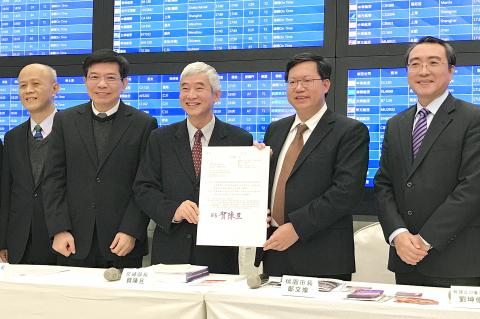The Taiwan Taoyuan International Airport Mass Rapid Transit (MRT) line is to begin trial operations on Thursday next week, with the official launch scheduled for March 2, Taoyuan Mayor Cheng Wen-tsan (鄭文燦) said yesterday.
Tickets for the airport MRT will be half price for one month after its launch in March, Cheng said, adding that normal ticket prices would apply starting on April 2.
Cheng made the announcement after the Ministry of Transportation and Communications issued an operating permit for the system yesterday afternoon.

Photo: CNA
Taoyuan Metro Corp, the line’s designated operator, took reporters on a tour of the airport MRT. However, the train was forced to slow down at one point because of an earthquake.
The trial run is to last for one month and would be conducted in two phases, Taoyuan Metro Corp president Chen Kai-ling (陳凱凌) said.
The company will only accept group reservations during the first phase, which starts from Thursday next week and runs through Feb. 15, he said.
“Group visitors will be government agencies, transportation experts and other organizations,” Chen said.
“Each group is to be capped at 40 people and will have a representative to receive the official invitation issued by Taoyuan Metro,” Chen said.
“Group visitors can only access the airport MRT line through the A1 Taipei Main Station, A3 New Taipei Industrial Park Station, A8 Chang Gung Memorial Hospital Station, A10 Shanbi Station, A18 Taoyuan High Speed Rail Station and A21 Huanbei Station,” he said.
The system will be open daily from 8am to 4pm during the trial run, he said.
The airport MRT will be open to the public in the second phase, from Feb. 16 to March 1, he added.
People do not need to make reservations and can access the system from any one of the 21 stations along the route between 8am and 4pm during the second phase, Chen said.
Each person would be given a number before they board the train, he said, adding that the number tags would be dispensed at the stations at 7:40am, 9:40am, 11:40am and 1:40pm.
Chen said the trial run would serve as a stress test for the system before its official launch, during which more than 700,000 people are expected to access the system.
After its launch, it will operate daily from 6am to 11pm, he added.
Asked about the airline check-in facility at Taipei Main Station, Taoyuan International Airport Corp president Hsiao Ting-ko (蕭登科) said that it would only be available for passengers boarding the train during the second phase. of the trial operation.
“As the [airport MRT] system is expected to open at 8am daily during the trial operation, we can check luggage for passengers whose flights leave after 11am,” Hsiao said.

MORE VISITORS: The Tourism Administration said that it is seeing positive prospects in its efforts to expand the tourism market in North America and Europe Taiwan has been ranked as the cheapest place in the world to travel to this year, based on a list recommended by NerdWallet. The San Francisco-based personal finance company said that Taiwan topped the list of 16 nations it chose for budget travelers because US tourists do not need visas and travelers can easily have a good meal for less than US$10. A bus ride in Taipei costs just under US$0.50, while subway rides start at US$0.60, the firm said, adding that public transportation in Taiwan is easy to navigate. The firm also called Taiwan a “food lover’s paradise,” citing inexpensive breakfast stalls

TRADE: A mandatory declaration of origin for manufactured goods bound for the US is to take effect on May 7 to block China from exploiting Taiwan’s trade channels All products manufactured in Taiwan and exported to the US must include a signed declaration of origin starting on May 7, the Bureau of Foreign Trade announced yesterday. US President Donald Trump on April 2 imposed a 32 percent tariff on imports from Taiwan, but one week later announced a 90-day pause on its implementation. However, a universal 10 percent tariff was immediately applied to most imports from around the world. On April 12, the Trump administration further exempted computers, smartphones and semiconductors from the new tariffs. In response, President William Lai’s (賴清德) administration has introduced a series of countermeasures to support affected

CROSS-STRAIT: The vast majority of Taiwanese support maintaining the ‘status quo,’ while concern is rising about Beijing’s influence operations More than eight out of 10 Taiwanese reject Beijing’s “one country, two systems” framework for cross-strait relations, according to a survey released by the Mainland Affairs Council (MAC) on Thursday. The MAC’s latest quarterly survey found that 84.4 percent of respondents opposed Beijing’s “one country, two systems” formula for handling cross-strait relations — a figure consistent with past polling. Over the past three years, opposition to the framework has remained high, ranging from a low of 83.6 percent in April 2023 to a peak of 89.6 percent in April last year. In the most recent poll, 82.5 percent also rejected China’s

PLUGGING HOLES: The amendments would bring the legislation in line with systems found in other countries such as Japan and the US, Legislator Chen Kuan-ting said Democratic Progressive Party (DPP) Legislator Chen Kuan-ting (陳冠廷) has proposed amending national security legislation amid a spate of espionage cases. Potential gaps in security vetting procedures for personnel with access to sensitive information prompted him to propose the amendments, which would introduce changes to Article 14 of the Classified National Security Information Protection Act (國家機密保護法), Chen said yesterday. The proposal, which aims to enhance interagency vetting procedures and reduce the risk of classified information leaks, would establish a comprehensive security clearance system in Taiwan, he said. The amendment would require character and loyalty checks for civil servants and intelligence personnel prior to